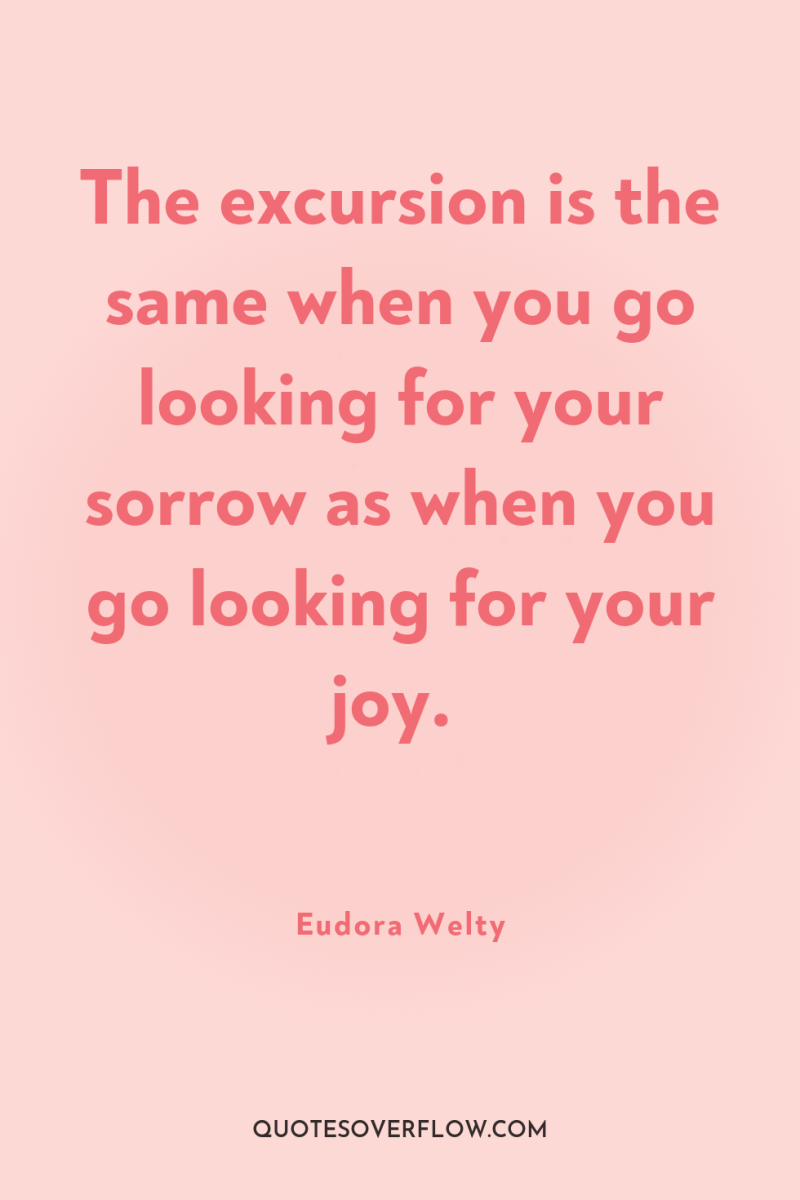
1
The excursion is the same when you go looking for your sorrow as when you go looking for your joy.Eudora Welty
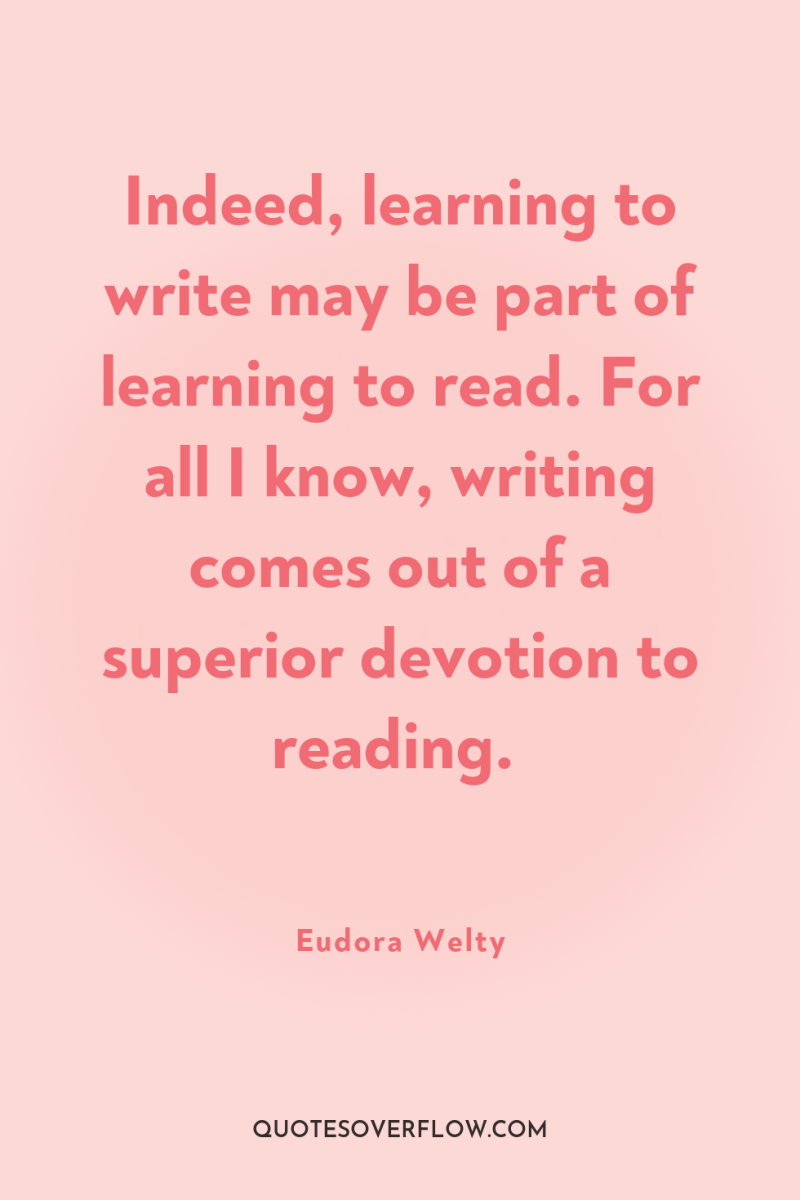
2
Indeed, learning to write may be part of learning to read. For all I know, writing comes out of a superior devotion to reading.Eudora Welty
3
I didn't hit other people or hit purposefully, I just hit. Some object would be at fault. My anger was at myself, every time, all vanity. As an adolescent I was a slammer of drawers and a packer of suitcases. I was responsible for scenes. Control came imperfectly to all of us: we reached it at different times of life, frustrated, shot into indignation, by different things - some that are grown out of, and others not. Of all my strong emotions, anger is the one least responsible for any of my work. I don't write out of anger. For one thing, simply as a fiction writer, I am minus an adversary - except, of course, that of time - and for another thing, the act of writing in itself brings me happiness.Eudora Welty
4
It had been startling and disappointing to me to find out that story books had been written by people, that books were not natural wonders, coming up of themselves like grass. Yet regardless of where they come from, I cannot remember a time when I was not in love with them -- with the books themselves, cover and binding and the paper they were printed on, with their smell and their weight and with their possession in my arms, captured and carried off to myself. Still illiterate, I was ready for them, committed to all the reading I could give them. .Eudora Welty
5
Long before I wrote stories, I listened for stories. Listening for them is something more acute than listening to them. I suppose it’s an early form of participation in what goes on. Listening children know stories are there. When their elders sit and begin, children are just waiting and hoping for one to come out, like a mouse from its hole.Eudora Welty
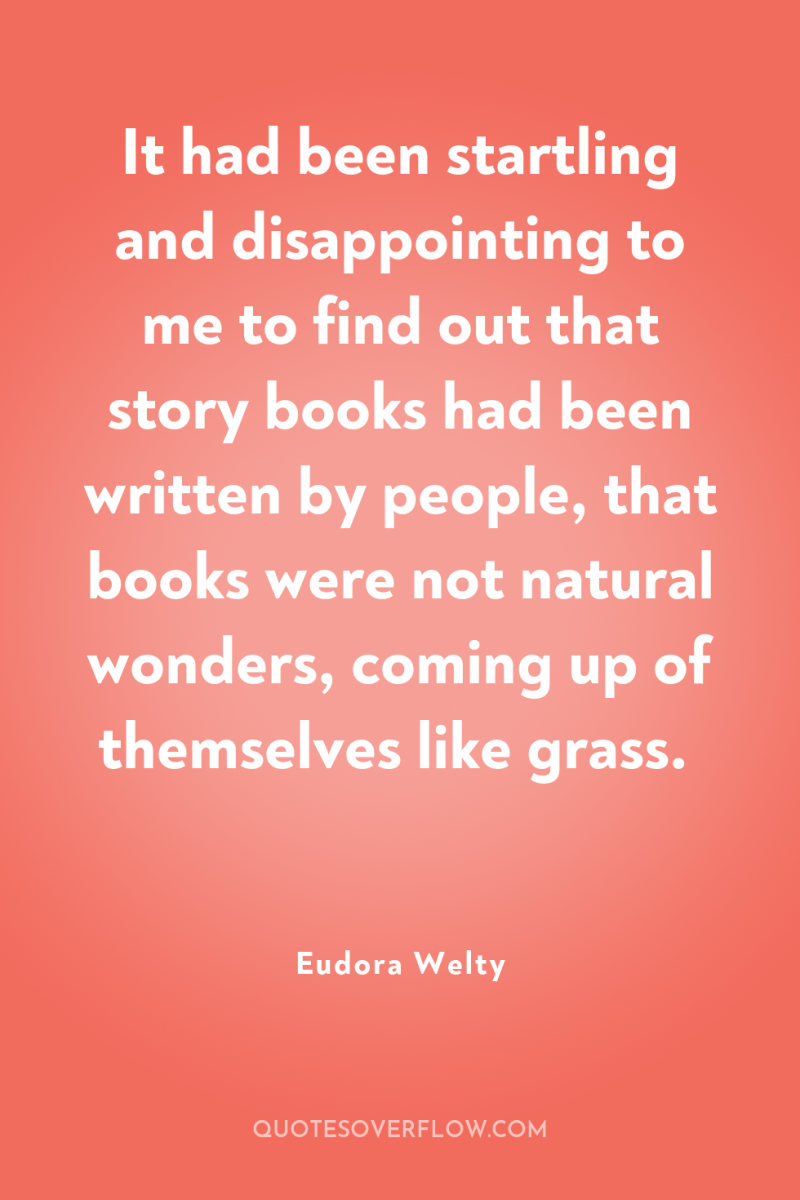
6
It had been startling and disappointing to me to find out that story books had been written by people, that books were not natural wonders, coming up of themselves like grass.Eudora Welty
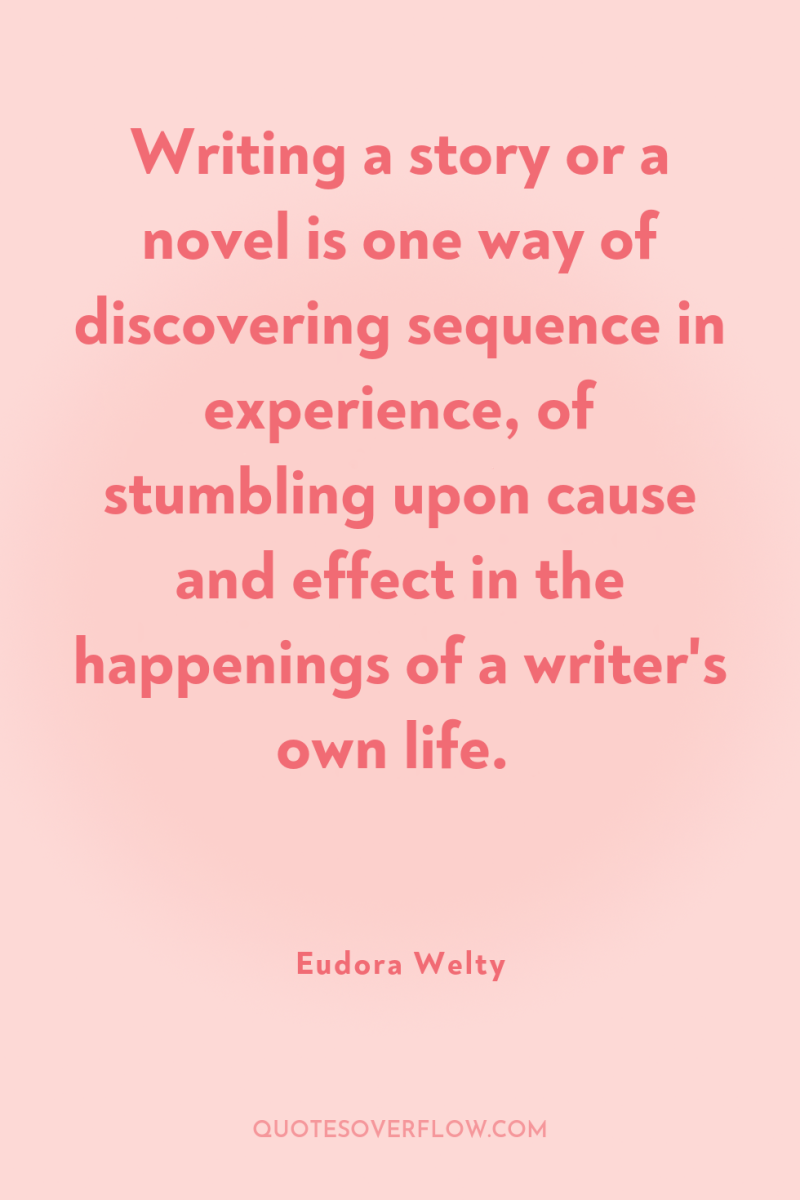
7
Writing a story or a novel is one way of discovering sequence in experience, of stumbling upon cause and effect in the happenings of a writer's own life.Eudora Welty
8
Both reading and writing are experiences--lifelong-- in the course of which we who encounter words used in certain ways are persuaded by them to be brought mind and heart within the presence, the power, of the imagination.Eudora Welty
9
Since we must and do write each our own way, we may during actual writing get more lasting instruction not from another's work, whatever its blessings, however better it is than ours, but from our own poor scratched-over pages. For these we can hold up to life. That is, we are born with a mind and heart to hold each page up to, and to ask: is it valid?Eudora Welty
10
For the source of the short story is usually lyrical. And all writers speak from, and speak to, emotions eternally the same in all of us: love, pity, terror do not show favorites or leave any of us out.Eudora Welty
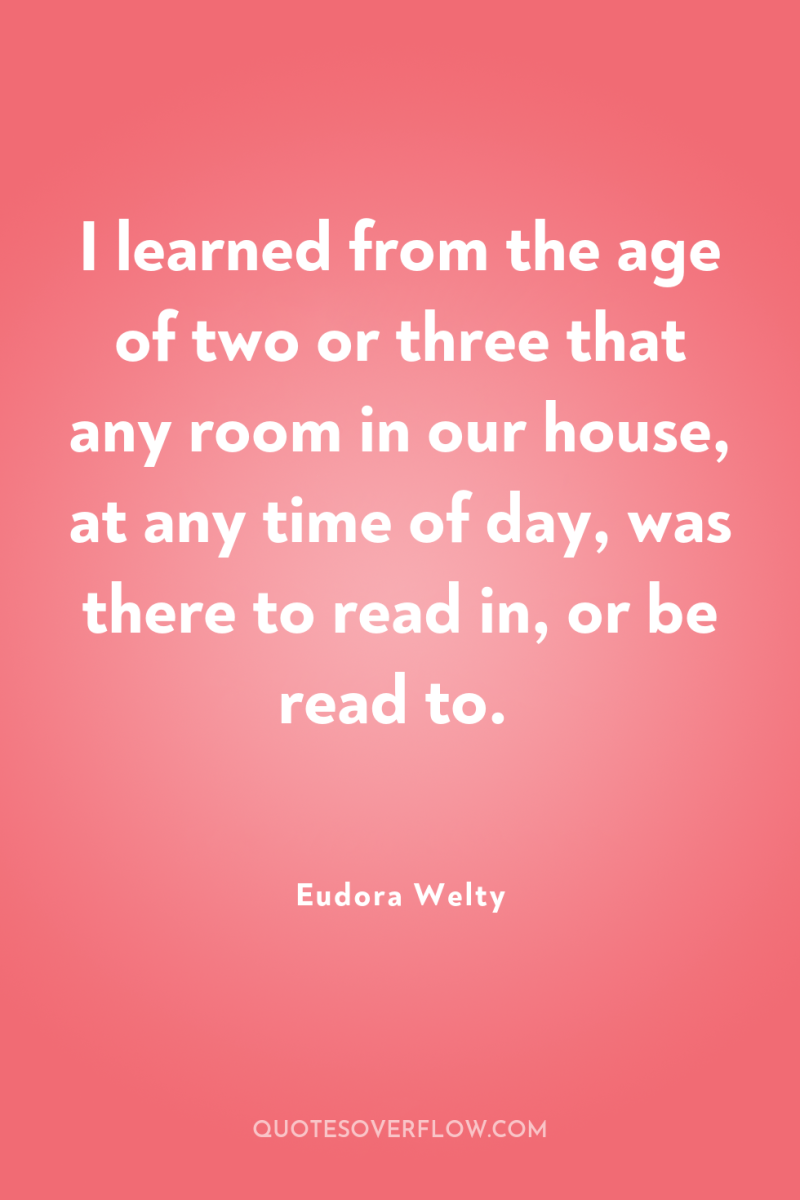
11
I learned from the age of two or three that any room in our house, at any time of day, was there to read in, or be read to.Eudora Welty
12
I painlessly came to realize that the reverence I felt for the holiness of life is not ever likely to be entirely at home in organized religion. It was later, when I was able to travel farther , that the presence of holiness and mystery seemed, as far as my vision was able to see, to descend into the windows of Chartres, the stone peasant figures of Autun, the tall sheets of gold on the walls of Torcello that reflected the light of the sea; in the frescoes of Piero, of Giotto; in the shell of a church wall in Ireland still standing on a floor of sheep-cropped grass with no ceiling other than he changing sky.Eudora Welty
13
I've always been shy physically. This in part tended to keep me from rushing into things, including relationships, headlong. Not rushing headlong, though I may have wanted to, but beginning to write stories about people, I drew near slowly; noting and guessing, apprehending, hoping, drawing my eventual conclusions out of my own heart, I did venture closer to where I wanted to go.Eudora Welty
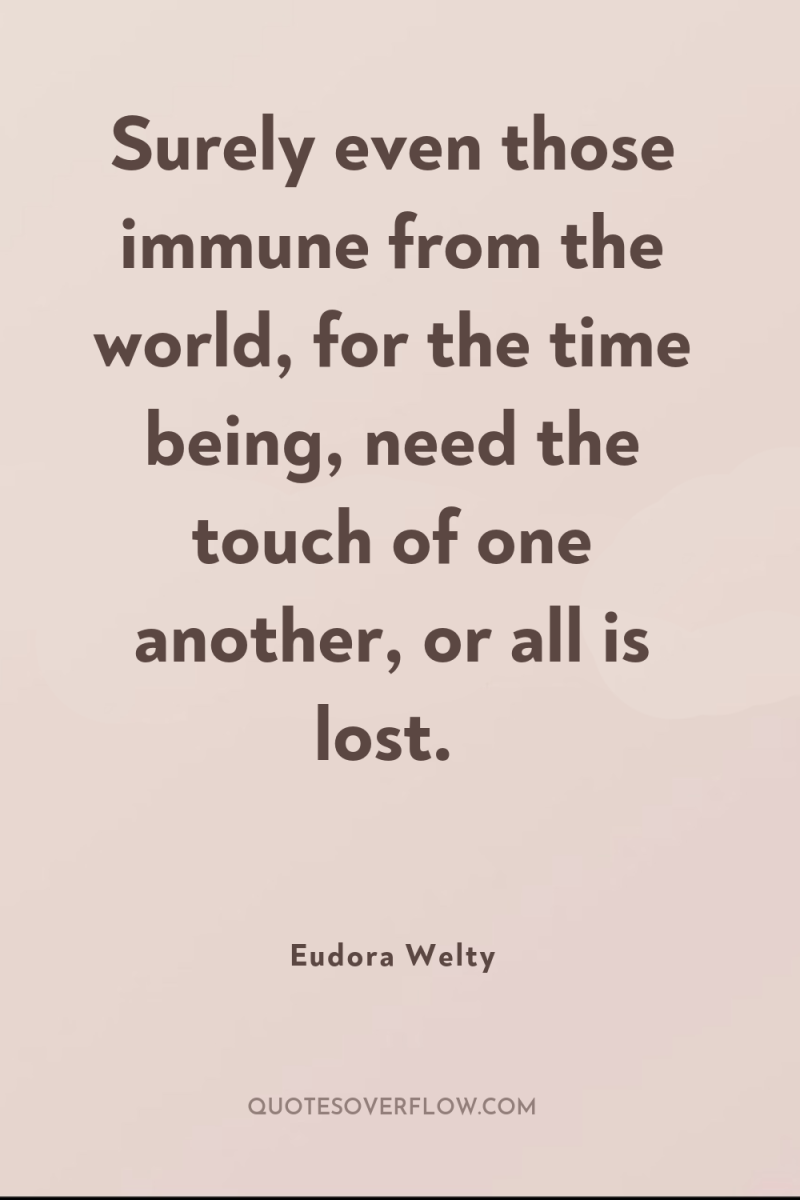
14
Surely even those immune from the world, for the time being, need the touch of one another, or all is lost.Eudora Welty
15
Through learning at my later date things I hadn't known, or had escaped or possibly feared realizing, about my parents - and myself - I glimpsed our whole family life as if it were freed of that clock time which spaces us apart so inhibitingly, divides young and old, keeps our living through the same experiences at separate distances. It is our inward journey that leads us through time - forward or back, seldom in a straight line, most often spiraling. Each of us is moving, changing, with respect to others. As we discover, we remember; remembering, we discover; and most intensely do we experience this when our separate journeys converge. Our living experience at those meeting points is one of the charged dramatic fields of fiction.Eudora Welty
16
The events in our lives happen in a sequence in time, but in their significance to ourselves they find their own order, a timetable not necessarily - perhaps not possibly - chronological. The time as we know it subjectively is often the chronology that stories and novels follow: it is the continuous thread of revelation.Eudora Welty
17
The frame through which I viewed the world changed too, over time. Greater than scene, I came to see, is situation. Greater than situation is implication. Greater than all of these is a single, entire human being, who will never be confined in any frame.Eudora Welty
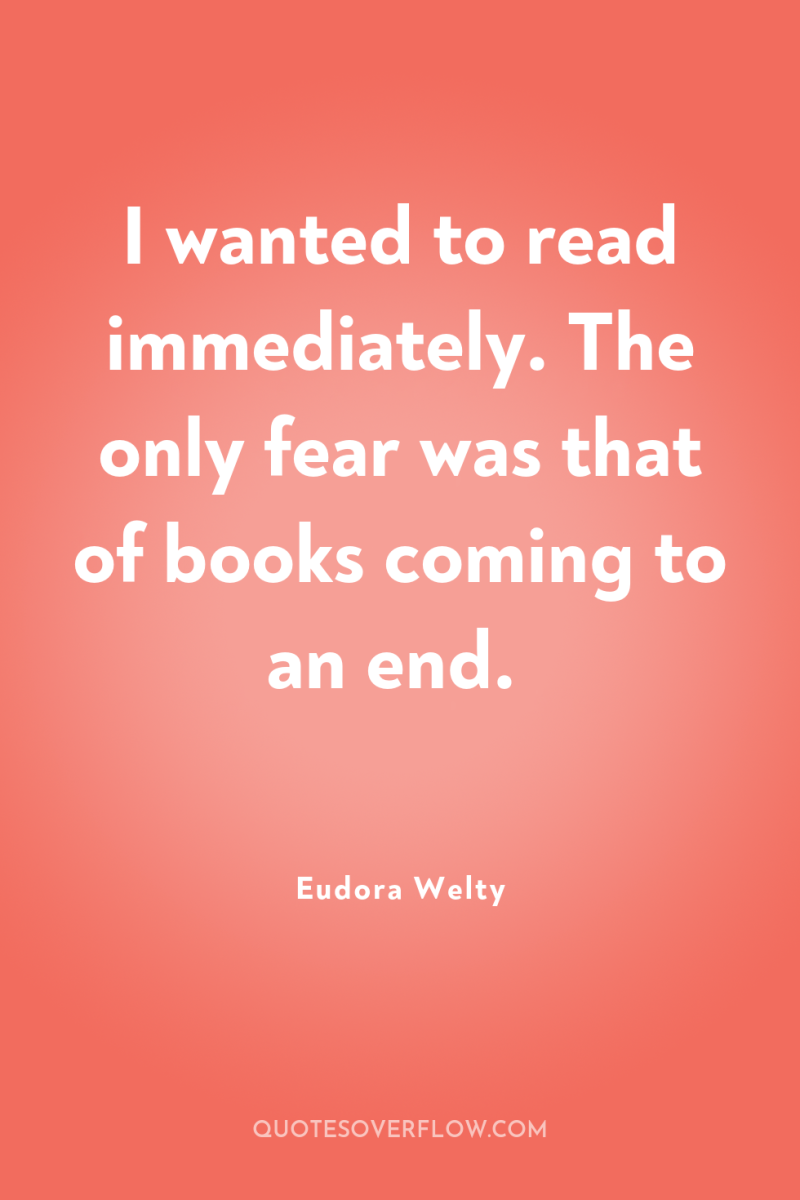
18
I wanted to read immediately. The only fear was that of books coming to an end.Eudora Welty
19
Two by two, I read library books as fast as I could go, rushing them home in the basket of my bicycle. From the minute I reached our house, I started to read. Every book I seized on stood for the devouring wish to read being instantly granted. I knew this was bliss, knew it at the time. Taste isn't nearly so important; it comes in its own time. I wanted to read immediately. The only fear was that of books coming to an end. .Eudora Welty
20
What discoveries I made in the course of writing stories all begin with the particular, never the general. They are mostly hindsight: arrows that I now find I myself have left behind me, which have shown me some right, or wrong, way I have come. What one story may have pointed out to me is of no avail in the writing of another. But 'avail' is not what I want; freedom ahead is what each story promises - beginning anew. And all the while, as further hindsight has told me, certain patterns in my work repeat themselves without my realizing. There would be no way of knowing this, for during the writing of any single story, there is no other existing. Each writer must find out for himself, I imagine, on what basis he lives with his own stories. .Eudora Welty
21
It was not my intention - it never was - to invent a character who should speak for me, the author, in person. A character is in a story to fill a role there, and the character's life along with its expression of life is defined by that surrounding - indeed is created by its own story. Yet, it seems to me now, years after I wrote The Golden Apples, that I did bring forth a character with whom I came to feel oddly in touch. She derived from what I already knew for myself, even felt I had always known. What I have put into her is my passion for my own life work, my own art. Exposing yourself to risk is a truth that Mrs. Eckhart and I had in common. What animates and possesses me is what drives Mrs. Eckhart, the love of her art and the love of giving it, the desire to give it until there is no more left. Of course any writer is in part all of his characters. How otherwise would they be known to him, occur to him, become what they are? In the making of her character out of my most inward and most deeply felt self, I would say I have found my voice in my own fiction.Eudora Welty
22
Learning stamps you with it's moments. Childhood's learning is made up of moments. It isn't steady. It's a pulse.Eudora Welty
23
She read Dickens in the same spirit she would have eloped with him.Eudora Welty
24
Evere since I was first to read, then started reading to myself, there has never been a line read that I didn't hear. As my eyes followed the sentence, a voice was saying it silently to me. It wasn't my mother's voice, or the voice of any person I can identify, certainly not my own. It is human, but inward, and it is inwardly that I listen to it. It is to me the voice of the poem or the story itself. The cadence, whatever it is that asks you to believe, the feeling that resides in the printed word, reaches me through the reader-voice. I have supposed, but never found out, that this is the case with all readers - to read as listeners - and with all writers, to write as listeners. It may be part of the desire to write. The sound of what falls on the page begins the process of testing it for truth, for me. Whether I am right to trust so far I don't know. By now I don;t know whether I could do either one, reading or writing, without the other.Eudora Welty
25
In real life I fell easily under the spell of all traveling artists. En route to New Orleans, entertainments of many kinds would stop over in those days for a single performance in Jackson's Century Theatre. Then, as now, my imagination was magnetized toward transient artists - toward the transience as much as the artists. I must have seen "Acrobats in a Park" at the time I wrote the story as exotic, free of any experience as I knew it. At the center of the little story is the Zorro's act: the feat of erecting a structure of their bodies that holds together, interlocked, and stands like a wall. Writing about the family act, I was writing about the family itself, its strength as a unit, testing its frailty under stress. I treated it in an artificial and oddly formal way; the stronghold of the family is put on view as a structure built each night; on the night before the story opens, the Wall has come down when the most vulnerable member slips, and the act is done for. But from various points within it and from outside it, I've been writing about the structure of the family in stories and novels ever since. In spite of my uncompromising approach to it, my fundamental story form might have been trying to announce itself to me.Eudora Welty
26
On the train I saw that world passing my window. It was when I came to see it was I who was passing that my self-centered childhood was over. But it was not until I began to write, that I found the world out there revealing, because memory had become attached to seeing, love had added itself to discovery, and because I recognized in my own continuing longing to keep going, the need I carried inside myself to know - the apprehension, first, and then the passion, to connect myself to it. Through travel I first became aware of the outside world; it was through travel that I found my own introspective way into becoming a part of it. This is, of course, simply saying that the outside world is the vital component of my inner life. My imagination takes its strength and guides its direction from what I see and hear and learn and feel and remember of my living world. But I was to learn slowly that both these worlds, outer and inner, were different from what they seemed to me in the beginning. .Eudora Welty
27
She (my mother) stood always prepared in herself to challenge the world in our place. She did indeed tend to make the world look dangerous, and so it had been to her. A way had to be found around her love sometimes, without challenging that, and at the same time cherishing it in its unassailable strength. Each of us children did, sooner or later, in part at least, solve this in different, respectful, complicated ways. .Eudora Welty
28
Taking trips tore all of us up inside, for they seemed, each journey away from home, something that might have been less selfishly undertaken, or something that would test us, or something that had better be momentous, to justify such a leap into the dark. The torment and guilt - the torment of having the loved one go, the guilt of being the loved one gone - comes into my fiction as it did and does in my life. And most of all the guilt then was because it was true: I had left to arrive at some future and secret joy, at what was unknown, and what was no in New York, waiting to be discovered. My joy was connected with my writing; that was as much as I knew. .Eudora Welty
29
In children's art class we sat in a ring of kindergarten chairs and drew three daffodils that had just been picked out of the yard; and while I was drawing, my sharpened yellow pencil and the cup of the yellow daffodil gave off wiffs just alike. That the pencil doing the drawing should give off the same smell of the flower it drew seemed part of the art lesson - as shouldn't it be? Children, like animals use all their sense to discover the world. Then artists come along and discover it the same way, all over again. Here and there, it's the same world. Or now and then we'll hear from an artist who's never lost it.Eudora Welty
30
Long before I wrote stories, I listened for stories. Listening for them is something more acute than listening to them. I suppose it's an early form of participation in what goes on. Listening children know stories are there. When their elders sit and begin, children are just waiting and hoping for one to come out, like a mouse from it's hole.Eudora Welty
31
When one of us (children) caught measles or whooping cough and we were isolated in bad upstairs, we wrote notes to each other perhaps on the hour. Our devoted mother would pass them for us, after first running them in a hot oven to kill the germs. They came into our hands curled up and warm, sometimes scorched like toast.Eudora Welty
32
All children in those small-town, unhurried days had a vast inner life going on in the movies. Children were allowed to go without chaperone in the afternoons. My sense of making fictional comedy undoubtedly first caught its spark from the antic pantomime of the silent screen, and from having a kindred soul to laugh with.Eudora Welty
33
There is absolutely everything in great fiction but a clear answer.Eudora Welty
34
Great fiction shows us not how to conduct our behavior but how to feel. Eventually, it may show us how to face our feelings and face our actions and to have new inklings about what they mean. A good novel of any year can initiate us into our own new experience.Eudora Welty
35
Art, though, is never the voice of a country; it is an even more precious thing, the voice of the individual, doing its best to speak, not comfort of any sort, but truth. And the art that speaks it most unmistakably, most directly, most variously, most fully, is fiction; in particular, the novel.Eudora Welty
36
Human life is fiction's only theme.Eudora Welty
37
Fiction shows us the past as well as the present moment in mortal light; it is an art served by the indelibility of our memory, and one empowered by a sharp and prophetic awareness of what is ephemeral. It is by the ephemeral that our feeling is so strongly aroused for what endures, or strives to endure.Eudora Welty
38
Writing a story or a novel is one way of discovering sequence in experience, of stumbling upon cause and effect in the happenings of a writer's own life. This has been the case with me. Connections slowly emerge. Like distant landmarks you are approaching, cause and effect begin to align themselves, draw closer together. Experiences too indefinite of outline in themselves to be recognized for themselves connect and are identified as a larger shape. And suddenly a light is thrown back, as when your train makes a curve, showing that there has been a mountain of meaning rising behind you on the way you've come, is rising there still, proven now through retrospect. Writing fiction has developed in me an abiding respect for the unknown in a human lifetime and a sense of where to look for the threads, how to follow, how to connect, find in the thick of the tangle what clear line persists. The strands are all there: to the memory nothing is ever lost.Eudora Welty
39
My father did not bring it up, but of course I knew that he had another reason to worry about my decision to write. Though he was a reader, he was not a lover of fiction, because fiction is not true, and for that flaw it was forever inferior to fact. If reading fiction was a waste of time, so was the writing of it. Why is it, I wonder, that humor didn't count? Wodehouse, for one, whom both of us loved, was a flawless fiction writer. .Eudora Welty
40
The fantasies of dying could be no stranger than the fantasies of living. Survival is perhaps the strangest fantasy of them all.Eudora Welty
41
The camera was a hand-held auxiliary of wanting-to-know. It had more than information and accuracy to teach me. I learned in the doing how ready I had to be. Life doesn't hold still. A good snapshot stopped a moment from running away. Photography taught me that to be able to capture transience, by being ready to click the shutter at the crucial moment, was the greatest need I had. Making pictures of people in all sorts of situations, I learned that every feeling waits upon its gesture, and I had to be prepared to recognize this moment when I saw it. These were things a writer needed to know. And I felt the need to hold transient life in words - there's so much more of life that only words can convey - strongly enough to last me as long as I lived. The direction my mind took was a writer's direction from the start, not a photographer's or a recorder's. .Eudora Welty
42
It was my first-year Latin teacher in high school who made me who made me discover I'd fallen in love with it (grammar). It took Latin to thrust me into bona fide alliance with words in their true meaning. Learning Latin fed my love for words upon words in continuation and modification, and the beautiful, sober, accretion of a sentence. I could see the achieved sentence finally standing there, as real, intact, and built to stay as the Mississippi State Capitol at the top of my street. .Eudora Welty
43
Memory lived not in initial possession but in the freed hands, pardoned and freed, and in the heart that can empty but fill again, in the patterns restored by dreams.Eudora Welty
44
A whole tree of lightning stood in the sky. She kept looking out the window, suffused with the warmth from the fire and with the pity and beauty and power of her death. The thunder rolled.Eudora Welty
45
My father knew our way mile by mile; by day or by night, he knew where we were. Everything that changed under our eyes, in the flying countryside, was the known world to him, the imagination to me. Each in our own way, we hungered for all this: my father and I were in no other respect or situation so congenial.Eudora Welty
46
A good snapshot keeps a moment from running away.Eudora Welty
47
I'm prepared now to use the wonderful word confluence, which of itself exists as a reality and a symbol in one. It is the only kind of symbol that for me as a writer had any weight, testifying to the pattern, one of the chief patterns, of human experience. Of course the greatest confluence of all is that which makes up the human memory - the individual human memory. My own is the treasure most dearly regarded by me, in my life and in my work as a writer. Here time, also, is subject to confluence. The memory is a living thing - it too is in transit. But during its moment, all that is remembered joins, and lives - the old and the young, the past and the present, the living and the dead. .Eudora Welty
48
On Sundays, Presbyterians were not allowed to eat hot food or read the funny papers or travel the shortest journey; parents believed in Hell and believed tiny babies could go there. Baptists were not supposed to know, up until their dying day, how to play cards or dance. And so on.Eudora Welty
49
It was late afternoon. This time tomorrow he would be somewhere on a good graveled road, driving his car past things that happened to people, quicker than their happening.(" Death of a Traveling Salesman")Eudora Welty
50
But he wanted to leap up, to say to her, I have been sick and I found out then, only then, how lonely I am. Is it too late? My heart puts up a struggle inside me, and you may have heard it, protesting against emptiness.. It should be full, he would rush on to tell her, thinking of his heart now as a deep lake, it should be holding love like other hearts. It should be flooded with love. There would be a warm spring day.. Come and stand in my heart, whoever you are, and a whole river would cover your feet and rise higher and take your knees in whirlpools, and draw you down to itself, your whole body, your heart too.(" Death of a Traveling Salesman") .Eudora Welty
51
We do need to bring to our writing, over and over again, all the abundance we possess. To be able, to be ready, to enter into the minds and hearts of our own people, all of them, to comprehend them (us) and then to make characters and plots in stories that in honesty and with honesty reveal them (ourselves) to us, in whatever situation we live through in our own times: this is the continuing job, and it's no harder now than it ever was, I suppose. Every writer, like everybody else, thinks he's living through the crisis of the ages. To write honestly and with all our powers is the least we can do, and the most.Eudora Welty
52
The journey took about a week each way, and each day had my parents both in its grip. Riding behind my father, I could see that the road had him by the shoulders, by the hair under his driving cap. It took my mother to make him stop. I inherited his nervous energy in the way I can't stop writing on a story. It makes me understand how Ohio had him around the heart, as West Virginia had my mother. Writers and travelers are mesmerized alike by knowing of their destinations. And all the time that we think we're getting there so fast, how slowly we do move. .Eudora Welty
53
A conscious act grew out of this by the time I began writing stories: getting my distance, a prerequisite of my understanding of human events, is the way I begin work. Just as, of course, it was an initial step when, in my first journalism job, I stumbled into making pictures with a camera. Frame, proportion, perspective, the values of light and shade; all are determined by the distance of the observing eye.Eudora Welty
54
There was one story that anger certainly lit the fuse of. In the 1960's, in my home town of Jackson, the civil rights leader Medgar Evers was murdered on night in darkness and I wrote a story that same night about the murderer (identity unknown) called "Where Is The Voice Coming From?" But all that absorbed me, though it started as outrage, was the necessity I felt for entering into the mind and inside the skin of a character who could hardly have been more alien or repugnant to me. Trying for my utmost, I wrote in the first person. I was wholly vaunting the prerogative of the short-story writer. It is always vaunting, of course, to imagine yourself inside another person, but it is what a story writer does in every piece of work; it is his first step, and his last too, I suppose. I'm not sure this story was brought off; and I don't believe that my anger showed me anything about human character that my sympathy and rapport never had.Eudora Welty
55
It was entirely taken for granted that there wasn't any lying in our family, and I was advanced in adolescence before I realized that in plenty of homes where I played with schoolmates, and went to their parties, children lied to their parents and parents lied to their children and to each other. It took me a long time to realize that these very same everyday lies, and the stratagems and jokes and tricks and dares that went with them, were in fact the basis of the scenes I so well loved to hear about and hoped for and treasured in the conversation of adults. My instinct - the dramatic instinct - was to lead me, eventually, on the right track for a storyteller: the scene was full of hints, pointers, suggestions, and promises of things to find out and know about human beings. I had to grow up and learn to listen for the unspoken as well as the spoken - and to know a truth, I also had to recognize a lie. .Eudora Welty
56
That summer lying in the long grass with my head propped up against the back of a saddle, with the zenith above me and the drop of distance below, I listened to the mountain silence until I could hear as far into it as the faintest clink of a cowbell. In the mountains, what might be out of sight had never really gone away. Like the mountain, that distant bell would always be there. It would keep reminding. .Eudora Welty
57
And it was so still. The silence of the fields seemed to enter and move familiarly through the house. The wind used the open hall. He felt that he was in a mysterious, quiet, cool danger. It was necessary to do what?...to talk.(" Death Of A Traveling Salesman")Eudora Welty
58
The thing that seemed like silence must have been the endless cry of all the crickets and locusts in the world, rising and falling.(" The Wide Net")Eudora Welty
59
It seems likely to me now that the very element in my character that took possession of me there on top of that mountain, the fierce independence that was suddenly mine, to remain inside me no matter how it scared me when I tumbled, was an inheritance. Indeed it was my chief inheritance from my mother, who was braver. Yet, while she knew that independent spirit so well, it was what she agonizingly tried to protect me from, in effort to warn me against. It was what she shared, it made the strongest bond between us and the strongest tension. To grow up is to fight for it, to grow old is to lose it after having possessed it.Eudora Welty
60
She (my mother) could still recite them (the poems) in full when she was lying helpless and nearly blind, in her bed, an old lady. Reciting, her voice took on resonance and firmness, it rang with the old fervor, with ferocity even. She was teaching me one more, almost her last, lesson: emotions do not grow old. I knew that I would feel as she did, and I do.Eudora Welty
61
Don't want to do a thing, Ran, do we, from now and on till evermore.Eudora Welty
62
It is not for nothing that an ominous feeling often attaches itself to a procession. In films and stories we see spectacles forming in the street and parades coming from around the corner, and we know to greet then with distrust and apprehension: their intent is still to be revealed.Eudora Welty
63
My temperament and my instinct had told me alike that the author, who writes at his own emergency, remains and needs to remain at his private remove. I wished to be, not effaced, but invisible - actually a profound position. Perspective, the line of vision, the frame of vision - these set a distance.Eudora Welty
64
People give pain, are callous and insensitive, empty and cruel...but place heals the hurt, soothes the outrage, fills the terrible vacuum that these human beings make.Eudora Welty
65
It took the mountain top, it seems to me now, to give me the sensation of independence. It was as if I'd discovered something I'd never tasted before in my short life. Or rediscovered it - for I associated it with the taste of water that came out of the well, accompanied with the ring of that long metal sleeve against the sides of the living mountain, as from deep down it was wound up to view brimming and streaming long drops behind it like bright stars on a ribbon. It thrilled me to drink from the common dipper. The coldness, the far, unseen, unheard springs of what was in my mouth now, the iron smell, all said mountain mountain mountain as I swallowed. Every swallow was making me a part of being here, sealing me in place, with my bare feet planted on the mountain and sprinkled with my rapturous spills. What I felt I'd come here to do was something on my own. .Eudora Welty
66
When my mother would tell me that she wanted me to have something because she as a child had never had it, I wanted, or I partly wanted, to give it back. All my life I continued to feel that bliss for me would have to imply my mother's deprivation or sacrifice. I don't think it would have occurred to her what a double emotion I felt. I could hardly bear my pleasure for the guilt. There is no wonder that a passion for independence sprang up in me at the earliest age. It took me a long time to manage the independence, (but) I have never managed to handle the guilt. In the act and the course of writing stories, these are the two springs, one bright, one dark, that feed the stream. .Eudora Welty
67
It was examinations (in school) that drove my wits away, as all emergencies do. Being expected to measure up was paralysing. It was never that Mother wanted me to beat my classmates in grades, what she wanted was for me to have my answers right. It was unclouded perfection I was up against.Eudora Welty
68
No art ever came out of not risking your neck.Eudora Welty
69
I am a writer who came from a sheltered life. A sheltered life can be a daring life as well. For all serious daring starts from within.Eudora Welty
70
People are mostly layers of violence and tenderness wrapped like bulbs, and it is difficult to say what makes them onions or hyacinths.Eudora Welty
71
The characters who go to make up my stories and novels are not portraits. Characters I invent along with the story that carries them. Attached to them are what I've borrowed, perhaps unconsciously, bit by bit, of persons I have seen or noticed or remembered in the flesh - a cast of countenance here, a manner of walking there, that jumps to the visualizing mind when a story is under way. I don't write by invasion into the life of a real person: my own sense of privacy is too strong for that; and I also know instinctively that living people to whom you are close - those known to you in ways too deep, too overflowing, ever to be plumbed outside love - do not yield to, could never fit into, the demands of a story. Characters take on life sometimes by luck, but I suspect it is when you can write most entirely out of yourself, that a character becomes in its own right another human being on the page.Eudora Welty
72
Our Victrola stood in the diningroom. I was allowed to climb onto the seat of a diningroom chair to wind it, start the record turning, and set the needle playing. In a second I'd jumped to the floor, to spin or march around the room as the music called for - now there were all the other records I could play too. I skinned back onto the chair just in time to lift the needle at the end, stop the record and turn it over, then change the needle. Winding up, dancing, being cocked to start and stop the record, was of course, all in one the act of listening. Movement must be at the very heart of listening.Eudora Welty
73
I learned from the age of two or three, that any room in our house, at any time of day, was there to read in, or to be read to. It had been startling and disappointing for me to find out that story books had been written by people, that books were not natural wonders, coming up of themselves like grass.Eudora Welty
74
When they turned off, it was still early in the pink and green fields. The fumes of morning, sweet and bitter, sprang up where they walked. The insects ticked softly, their strength in reserve; butterflies chopped the air, going to the east, and the birds flew carelessly and sang by fits. They went down again and soon the smell of the river spread over the woods, cool and secret. Every step they took among the great walls of vines and among the passion-flowers started up a little life, a little flight.' We’re walking along in the changing-time, ' said Doc. 'Any day now the change will come. It’s going to turn from hot to cold, and we can kill the hog that’s ripe and have fresh meat to eat. Come one of these nights and we can wander down here and tree a nice possum. Old Jack Frost will be pinching things up. Old Mr. Winter will be standing in the door. Hickory tree there will be yellow. Sweet-gum red, hickory yellow, dogwood red, sycamore yellow.' He went along rapping the tree trunks with his knuckle. 'Magnolia and live-oak never die. Remember that. Persimmons will all get fit to eat, and the nuts will be dropping like rain all through the woods here. And run, little quail, run, for we’ll be after you too.' They went on and suddenly the woods opened upon light, and they had reached the river. Everyone stopped, but Doc talked on ahead as though nothing had happened. 'Only today, ' he said, 'today, in October sun, it’s all gold–sky and tree and water. Everything just before it changes looks to be made of gold.'(" The Wide Net") .Eudora Welty
75
Henry James said there isn't any difference between "the English novel" and "the American novel" since there are only two kinds of novels at all, the good and the bad.Eudora Welty
76
Children like animals use all their senses to discover the world. Then artists come along and discover it the same way all over again.Eudora Welty
77
Out of love you can speak with straight fury.Eudora Welty
78
All serious daring starts from within.Eudora Welty
79
Never think you've seen the last of anything.Eudora Welty
80
The events in our lives happen in a sequence in time but in their significance to ourselves they find their own order ... the continuous thread of revelation.Eudora Welty
81
I can't think I had much of a sense of humor as long as I remained the only child. When my brother Edward came along we both became comics, making each other laugh.Eudora Welty
82
Through travel I first became aware of the outside world it was through travel that I found my own introspective way into becoming a part of it.Eudora Welty